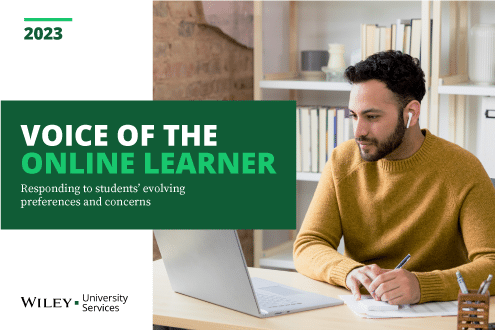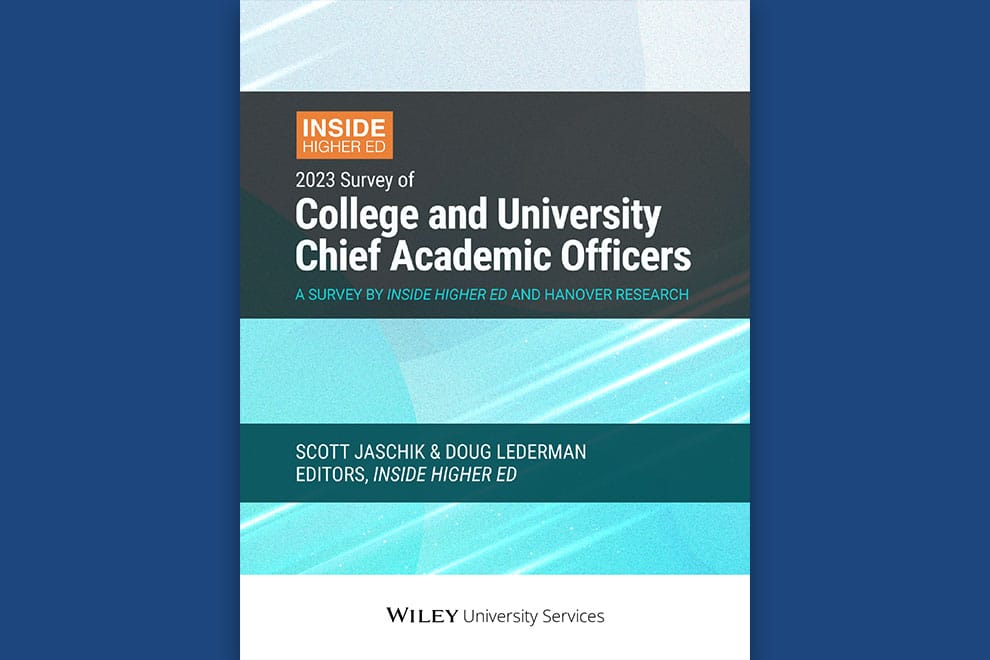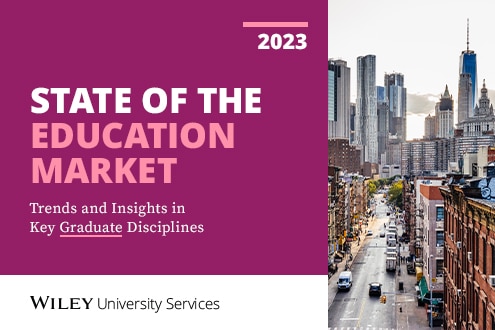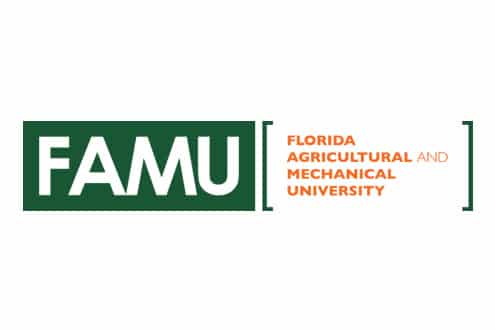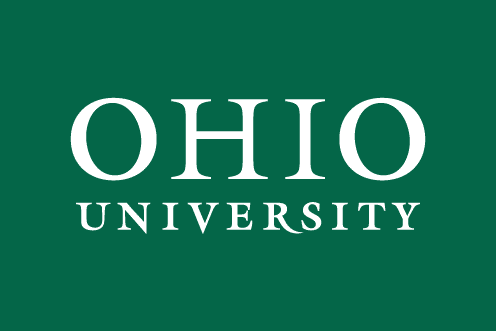Speaker 1:
You’re listening to An Educated Guest, a podcast that brings together great minds in higher ed to delve deeper into the innovations and trends guiding the future of education and careers. Hosted by the Executive Vice President & GM of Wiley University Services and Talent Development, Todd Zipper.
Todd Zipper:
Hello, I’m Todd Zipper host of An Educated Guest. On today’s show, I speak with Christine Cruzvergara, Chief Education Strategy Officer at Handshake. Christine is highly recognized within the field of career education, having received national recognition for her forward thinking work. She received the 2017 Career Excellence Award from NACE and the 2017 Innovation Award from Eduventures. The key takeaways from our discussion today;
Todd Zipper:
First, how Handshake works with students, universities, and employers to help young professionals jumpstart their careers. Second, the democratization of hiring practices and how it leads to a more diverse candidate poll. Third, what industries are seeing high growth and what roles are becoming more popular. Fourth, why we should acknowledge the new learner and why higher ed needs to shift to accommodate these students. And fifth, the three skills students need to be career ready, hard skills, soft or core skills and career management skills. Christine, thank you for being here today.
Christine Cruzvergara:
Thank you so much for having me, Todd.
Todd Zipper:
Great. I’m really excited to jump into your work with Handshake and talk to you about career connected education and career services. But first, I’d like to discuss your background. You started off in higher education, correct?
Christine Cruzvergara:
I sure did.
Todd Zipper:
Awesome. Can you tell us how you eventually got to where you are today?
Christine Cruzvergara:
Sure, absolutely. How much time do have Todd? I’ll keep this brief. So I’ve been at Handshake as the Chief Education Strategy Officer for about three years. It’ll be three years in January. And prior to that, I spent the past decade of my career in higher education up and down the east coast. I’ve worked at large and small institutions, public and private institutions. I always say the easiest way to remember my resume is I worked at all of the Georges in the D.C. area. So GW, Georgetown and George Mason before heading north to Boston for Wellesley College.
Christine Cruzvergara:
What I primarily did when I worked in higher education was help different schools redesign what career education could look like so that it could be better integrated into the fabric of their institution and more mission critical for all of their students, as they thought about student success from a broader lens. One of the things I discovered that I enjoyed so much was literally change management. How do you get an institution of stakeholders to buy into a vision of what this could look like for their students?
Christine Cruzvergara:
And as a result, that led me to actually using Handshake as a technology partner when I was in higher education. And lo and behold, here I am working on the other side.
Todd Zipper:
Voila.
Christine Cruzvergara:
Yeah. Now working with over 1,400 universities and colleges. So it’s been really fun to continue to lead change, but now in a very different way.
Todd Zipper:
Yeah. I love that you mentioned change management because when people think of career, I’m not afraid to say career connected education. I talk about it all the time. We work with a few of the Georges too, by the way, and yet it seems like a stigma almost like, oh, that’s for vocational schools or for community college, but yet people are going to college, especially now we’re learning that the new majority learner, which is approaching 70%, which is an adult with a job and wants a better job. So that’s why they’re there is for career connected education. How do we get rid of that stigma?
Christine Cruzvergara:
Well, I think it’s understanding that it’s not a dichotomy. So I think a lot of times the reason the stigma exists is because people have an argument about what’s the purpose of higher education? Is it to build enlightened and educated citizens or is it for vocational training? Why can’t it be both? Why does it have to be an either or statement. It could be a both and statement. I think the other piece to really keep in mind in terms of removing the stigma is I don’t know a single institution out there that doesn’t care about equity and access.
Christine Cruzvergara:
I don’t know a single institution that isn’t talking about DEI, and isn’t thinking about how do we actually help low income, first gen, students of color find their way into higher education, find their way through higher education and get more successful in the end. And if we genuinely care about that, then career is actually a very critical part of that conversation. Because to say that students don’t have to worry about what they’re going to do after college is an extremely privileged point of view.
Todd Zipper:
Absolutely. So let’s jump in to Handshake. Tell us about this incredible company. I think they’re maybe one of our new ed tech unicorns, or maybe not new, but I that’s what got my attention a little back.
Christine Cruzvergara:
Sure. Yeah. We are officially unicorn status. So Handshake is the largest early year network helping millions of students start, jumpstart, restart their careers. And so we do that by partnering with over 1,400 universities and colleges nationwide. We have four year institution partners. We also now have two year institution partners and technical colleges and we help them connect their students. We have over 18 million students in our network and we connect them to about 600,000 employers.
Christine Cruzvergara:
And so at scale, we are actually able to help democratize opportunity for our students. That’s been the mission of Handshake from the very beginning, seven years ago when the co-founders founded Handshake. We take that mission very, very seriously. We have always been about democratizing access to opportunities, to information because students can make more informed decisions with the right information and democratizing social capital, which is another piece that is really critical. We know how important relationships are when you’re thinking about your career journey. And in the future, we’re also going to be talking about democratizing skills. So that’s on the horizon for us.
Todd Zipper:
A lot to jump into here. I’ve been thinking about my experience back in college where I crammed into a room, maybe tried to hear a presentation to make sure I signed my name on some sheet that they remember me when I applied after I got my 50th rejection letter. But I think that’s what… When you’re talking about democratization, it’s the idea that these employers cannot just maybe go to five or 10 or 15 campuses. They just have limitations. You could really get them to see all of the people on your network. Is that one way you’re thinking about the democratization?
Christine Cruzvergara:
Yeah, that’s exactly right. So if you think about university or college recruiting in the past, you would take an employer. That employer would maybe have a core list of 20, 30, if you’re lucky 50 schools that they would historically recruit at. And those schools were typically either geographically located near them, or it was perhaps an institution where their senior execs or directors went to school themselves. And so it would perpetuate a cycle of where they typically recruited from and you would end up with a similar type of candidate pool if you were an employer.
Christine Cruzvergara:
And for a student, you knew there were only certain employers that recruit your institution. And so what Handshake did was we broke that model by creating a network. So now as an employer, you log into one system, you’re able to have access to all the institutions and to all the students, you can set your criteria for what types of skills you’re looking for, for students who are interested in moving to Kansas City and you can actually now find students regardless of what school they go to or what they majored in by the skills and the characteristics, the criteria that you’re actually looking for.
Christine Cruzvergara:
And so every school that has partnered with us has seen over a 200% increase in the opportunities, as well as employer relationships, they’ve been able to cultivate for their students. And students able to now have access to better opportunities, and of course in turn, employers are actually able to have a more diverse candidate pool.
Todd Zipper:
Yeah. I was thinking about going back to my experience only one, but I found that the career services office was quite disconnected from my major, from the educational experience. So can you maybe frame for audience, what is a typical career services office? How does it work and how do learners and employers view the career offices as a service positively, negatively, neutrally?
Christine Cruzvergara:
Such good question. What I would say is a modern career center is one that is helping students to not only assess themselves, what do they value? What are they good at? What could they actually contribute to the world? They are helping them to then make sense of that information and find and connect to great opportunities. And they’re help helping to broker those relationships and those connections that are happening. Now, in modern center, that can happen in a number of different ways. That can happen through technology, that could happen through alumni connections, that could happen through corporate connections.
Christine Cruzvergara:
There are a million different ways that a career center might organize or structure itself so that it can do some of those things. One of the driving characteristics of a modern career center, however, is one that should not look anything like what you experienced Todd, when you are in school, because the world of work around us and the way employers recruit has changed dramatically since you and I were in college. So if you were to step back into an institution and if that career center essentially looks the same as you and I experienced, you know that it hasn’t kept up with the way that things have changed, versus there are absolute the institutions out there who have kept up, who have been thinking about how do we do this differently? How do we let go of control in some other ways? How do we become connectors or conveners instead? How do we redefine our role?
Christine Cruzvergara:
And I think that’s probably one of the biggest challenges ahead of us, both in education, as well as in leaders in this world of work, future of workspace is to not be afraid to embrace change. Going back to the change management theme from before, the world of work is changing very rapidly around us. And the reality is the needs and the wants of our students are also changing around us. And so if we want to be the most effective at serving them and making sure that we actually help them jump their careers, well, we also need to be willing to embrace redefining what the role of career services looks like and how we do that effectively.
Todd Zipper:
Fascinating. Can you talk to us about the hierarchy of your customer? Feels like three, you’ve got the employer, you’ve got the students, you’ve got the university partner. How did Handshake come into being? Did you come out first to the universities to set up this service? How did it all come to being and how do you think about your customer today?
Christine Cruzvergara:
We originally started with our university partners. We started by partnering with somebody who we decided actually had the same mission. We wanted students to be successful. They want students to be successful. So we decided we’re going to start with our university partners and we’re going to build the network from there. And recognizing that our goal and our mission is actually very similar, but also in recognizing that we have different strengths. As a technology partner, we have certain strengths like our ability to scale or to use technology to be even more personalized and customized, which our students expect these days.
Christine Cruzvergara:
On the flip side, we can’t provide some of the hands on experience that allows students to make sense of some of that stuff in the way that a person can do that. And so we really believe in that partnership with our universities first and foremost. That is at the heart and core of what we do. Of course, our universities therefore help bring students into the network and so that was the second piece of it. And then a few years into Handshake’s history, we open up to employers from that perspective and really growing the employer base and thinking about how do we streamline the recruiting process for them?
Christine Cruzvergara:
How do we make it easier for them to be able to access opportunity? How do we make it easier for students to be able to actually find those opportunities? But I will say our number one value has always been and will always be students first. So we design the product from a student perspective in making sure that it is ideally the most delightful experience that a student can have to make it as easy as possible because this process is already not so easy and can cause a lot of anxiety for a lot of students.
Todd Zipper:
I assume that the model is paid for by the employer, just kind of you get access to the network?
Christine Cruzvergara:
Yeah, that’s absolutely right. So we actually have a ton of free services for employers, but if an employer would like to be more proactive in their recruiting versus reactive in their recruiting, they can certainly pay for premium services, which gives them better analytics and data in terms of how their applications are doing, how their recruiters are doing. Gives them a better sense of their pipeline in the funnel and how students are flowing through all of that. It gives them better branding as well.
Christine Cruzvergara:
So yes, they can absolutely pay for premium services if they wish to do that. I will also say our university partners also pay an annual subscription so that they can provide this to their students and so that they can also have access to data on how their students are engaging so that they can better determine how do they want to intervene. Where’s the best use of their time? How can they engage students and get them into the programs that they’re offering?
Todd Zipper:
It’s really impressive how you’ve been able to wedge into this market. You’ve got the LinkedIns and the Indeeds and the ZipRecruiters and you all are creating this two-sided market, which usually ends only in one place where there’s one dominant player. How have you seen that gone? When did you hit your inflection point in the market?
Christine Cruzvergara:
Well, I would actually say part of the success is the fact that we’re not a two-sided marketplace, we’re a three-sided marketplace. And we’ve always worked very, very hard to make sure that we maintain all three sides. And it is, it’s always a challenge. It’s always a juggle when you have universities, employers, and students, as much as we all care about the same thing, we all go about doing our work in slightly different ways, and so there are always competing demands as we think about the growth of that.
Christine Cruzvergara:
I would say the inflection point was probably around 2017. We’re very proud of the fact that our university network has grown exponentially year-over-year. So it might be a little bit unheard of, but for an ed tech company, we typically add about 200 schools to our network every single year. And in 2017 in particular, that was where we hit a really great tipping point. Brought in about 300 to 350 schools that year. It helped to solidify majority market share.
Todd Zipper:
So the students do you… What about folks that graduate? Like the class of 2020 that was stuck and then no one was hiring. How long can they use the platform before they age out, if you will?
Christine Cruzvergara:
Forever, Todd, forever. Yeah. Students can continue to stay. We want alumni to continue using Handshake. We’re actually, as we think about future plans for the platform, we’re continuing to evolve the platform to also grow with our student base who are now young alumni and young professionals. We want them to be able to come back for their second, their third, their fourth jobs. So forever. We want them to keep coming back. We’re also trying to build in ways for them to give back in different ways.
Christine Cruzvergara:
So one of the things that makes Handshake unique, you had asked the question about some of our competitors. We actually foster relationship building on the platform. So many of our students, especially if you’re underrepresented or you’re first gen student, you don’t go to school with a network. It’s not like you have a bunch of connections that are going to help you get a job when you graduate. You have to figure all of that out on your own and you have to start building that network yourself.
Christine Cruzvergara:
Well, that’s incredibly intimidating and it’s very hard to do that as a student. And so on Handshake, one of the things that we facilitate is the connection between students to students, students to alumni, and students to recruiters, so that the process doesn’t have to feel like a black box, but is a place where they can start to humanize the process a little bit. And so as an alum, we actually would invite you back so that you can connect to fellow students who have been in your shoes, who you understand, and you can now help them now that you’ve gotten past that point.
Todd Zipper:
Yeah. That makes a lot of sense. And also, as you think about, like you said, coming back, education is not just one and done. You’re going to have to keep coming back to education. Probably, if you can keep the job process, the educational process in a similar place, I think that’s pretty powerful. So that makes a lot of sense. Can you talk a little bit about what are the common jobs that you’re seeing right now? Just be curious to see what… Your data must be incredible and where people are getting hired, which companies? I mean, whatever you can share that’s publicly available.
Christine Cruzvergara:
Sure, of course. We’re always seeing trends. In particular, the past couple of years, I think it’s no surprise to anyone we’ve seen increases in hiring around healthcare, around tech, finance and consulting continue to be very popular choices as well as high growth options for many students. So those continue to be some pretty popular areas. I think what was actually interesting during the pandemic, and it has ebbed and flowed a little bit in 2021 was education. So education was contracting in some ways, certainly within the higher education space, but it was also growing in other ways, as institutions, particularly K through 12, had to think about instructional design. They had to think about virtual learning. They had to think about a lot of other type types of roles that didn’t exist before and so you kind of saw a little bit of a growth in some of those areas.
Christine Cruzvergara:
As you can imagine, tech is essentially found now in every sector and every industry that you’re looking at. So shifting from industry to actual job roles. You’re seeing a lot of roles that require some level of fluency with technology. You’re also seeing a lot of roles require data analytics or the ability to make sense of data and insights. So those are some of the most popular roles for sure. And then I would also say one of the articles that I wrote a little while back talked about new collar jobs. There are more jobs now, too that touch on… You could think of those as programming jobs, for example.
Christine Cruzvergara:
So it’s a great potential career path. Could be very lucrative for someone. It’s typically related to the technology field and it has a vocational bent in that you could get skilled or trained in that particular area, even without a degree or with just a two-year degree and you could start working right away. There’s usually a typical career path for you to be able to move up or move around in an institution. So it’s not a blue collar job, but much more what people would call now a new collar job. So that’s also a big thing that we’re seeing.
Todd Zipper:
Does Handshake help get involved in the learning educational process? So you’re these two sided marketplace to a degree. You got employers with jobs, you got students with some kind of educational background, but we know that a lot of times there’s a disconnect there, hence the number of unemployed people in the market and all the jobs that are being unfilled today, are you guys thinking about get into that space of recommending, providing insights into like, “Hey, you could get these skills and then maybe you can get that job.”
Christine Cruzvergara:
Yeah, that’s a great question, and certainly an area that we’re very excited about exploring. So we’re in early conversations about what the skills space could look like. Todd, you’ve been in this space for a long time. You know how fragmented that is. And as a learner, there’s a lot of information out there and there’s a lot to try and make sense of and to try and collate and figure out, okay, what does this mean for me based on what it is I want to do. So we recognize that we sit on a lot of really important data from employers in particular, around what they’re looking for, what they’re hiring for, what they want to see in order to interview you.
Christine Cruzvergara:
We know that we could help to consolidate a lot of that data and insight to make it easier for a job seeker or a learner to say, “Do I have this? Do I not have this? And if I don’t have this, where could I go to get that?” And luckily we already have amazing relationships with so many institutions, many of whom sometimes offer these nanodegrees or certifications or continuing ed classes that could very much help just get that extra jump start that they might need.
Todd Zipper:
Yeah. That insight would be, I think, really helpful for students. So I know that your team published a white paper earlier this year, where you outlined the trends that are shifting the needs to focus on career readiness. Can you tell us more about these specific trends and what you’re seeing?
Christine Cruzvergara:
Yeah, 100%. Let’s actually start really macro. When you think about the shifting nature of higher education, I think one of the first things we have to pay attention to is the changing demographic. So over the past decade, you’ve already seen the demographic of students become more or less non-traditional from a lot of different perspectives and vantage points. We have more first gen students, we have more students of color, we have more low income students that are considering higher education and coming into our systems. Now, higher education was never designed for those students. And so those students sometimes struggle to get through this systems that we have historically created that were not made for them in the first place.
Christine Cruzvergara:
And so that is one of the major trends that we have to keep in mind if we wish for higher education to remain valuable and to be seen by the general public as something worthwhile to invest in. So how do we acknowledge the changing demographic and the need to redesign some of our systems so that our students can all be successful in getting through that experience or that pipeline? The second thing that I would say is really critical to keep in mind is the shifting nature of the skills conversation I actually just touched on briefly.
Christine Cruzvergara:
So what’s important there is that employers, because they are moving away from necessarily just a school or core based model to more of a skills based hiring model. It’s really critical for institutions to think about how will they fast track their curriculum? How will they think about ways to stay agile or adaptable for their student population that can also meet the needs of the economy around them. Many, let’s just take state institutions, for example, are economic drivers for their city, or their region, or their area.
Christine Cruzvergara:
Well, hopefully more and more of them are starting to pay attention to what do those employers need or want and how can we think about some of those credentials, some of those skills, some of those certificates? Whether that is through the traditional lens of our core curriculum, or is that through another way in which we might need to design courses or classes. I know that there are many institutions out there that are also thinking about competency based learning and whether or not they should pursue that more as well. So I think that all fits into another category.
Christine Cruzvergara:
And then the third and last category that I’ll talk about is virtual. I think this is a particularly interesting one because I’ve never seen higher ed move so fast as I did in 2020, when everybody, all of a sudden needed to shift from in-person into virtual within a matter of just a couple of weeks. And the reality was higher ed did it. They were able to actually do it. Now, some to varying degrees of success. But the reality was for a whole year, essentially people shifted to virtual. They might not have liked it, but they could do it. As a result, many of us learned the benefits of what that meant.
Christine Cruzvergara:
We got used to more flexibility. Our students got used to more flexibility. They got used to having access to be able to schedule certain things. So from a purely recruiting standpoint, one of the things that we have discovered is even those students would like to be back in person socially with their friends. They certainly want to graduate in person. They would love to be able to be in the dining halls with their friends. When it comes to recruiting, they actually want employers and they want their institutions to maintain some level of virtual.
Christine Cruzvergara:
The reason why is because they can be more planful, they can be better prepared to showcase their best self, and for students of color and women in particular, they feel more seen in a virtual setting because they don’t feel like they’re trying to jockey for air time and space in a physical event. And so when you think about neurodiverse students, when you think about students who might be shy, when you think about so many of our employers who wish to recruit right now, they have to consider those different modalities in doing that.
Christine Cruzvergara:
And so those are the three major macro themes and trends that we’re seeing that I think adds to this conversation. The last piece I would just add as it relates to virtual is the reality is every single employer across most sectors have some form of hybrid work or flexibility or virtual work and schools have a responsibility to help prepare their students for what that might look like when they leave their campuses, and so how do you model that?
Todd Zipper:
Yeah, I have a thesis, although completely unfounded by data that in a virtual environment, the playing field’s a little bit more even. Your biases are always showing up in some way. I’m sure of that, but it’s a two dimensional screen. We’re on the same size. You don’t know how tall I am or whatever, you’re just there with your ideas and your speech. And if ultimately, the workforce is going to be more virtual, I think an interview setting like this makes a lot of sense actually. Going forward for a lot of the workforce, not all of it, of course.
Christine Cruzvergara:
That’s exactly right.
Todd Zipper:
So it’s interesting, you talked about a lot of the ideas of career readiness and I was listening to Sal Khan Academy the other day, talk about college readiness and college algebra and all these things and how forgot what large percentage of people have to go back to seventh or eighth grade math when they get to college. But it’s scary to think about going to career readiness. How many people are about to graduate from whatever program they’re in and they’re probably not career ready, however you define that. I mean, we own a business called mthree, which does talent development, essentially around tech skills where we try to make them job ready, right then not in six months from now. So how do you think about that career readiness and how your service, or just in general colleges can evolve here?
Christine Cruzvergara:
Well, career readiness is such a multifaceted label if you will. There are a lot of components that go into what makes somebody career ready. There’s of course, I would say if we were to have three separate categories, I would say they’re the quote-unquote typical hard skills that someone would need to be career ready for whatever industry or job role that they would like to go into. So that’s one category. The second category is what some people would call soft skills. I typically call them core skills that are really helpful in terms of being the difference between a good and an employee. We’ll talk about that in a second.
Christine Cruzvergara:
And then the third bucket is really career management skills, the actual ability to look and search for a job, interview, to know how to negotiate, to know how to ask for a raise once you’re in a job, to know how to be successful. And a student essentially needs all three buckets to be full in order to truly be career ready. I think the responsibility is certainly on institutions in partnership, certainly with a number of different stakeholders to make sure that students get all of that sometime over the course of their four years.
Christine Cruzvergara:
In my opinion, I think the best model is to ensure that that begins starting freshman year, because the process of figuring out each of those buckets really starts from a place of understanding who you are as a person. And as you know, college is the perfect time for you to begin to explore who are you? What are you like? What do you not like? What do you value? What are your strengths? These are some very basic questions, but Todd, I’m positive you’ve interviewed candidates before to work for your team and the reality is you can tell a big diff between someone who has a good grasp of that and how they then answer interview questions and how they project themselves against candidates who are still struggling to figure that out.
Christine Cruzvergara:
And so all of this has to happen starting the first year in college. That exploration, those types of questions, that reflection has to be constant and continue as you actually build in each of these buckets. So if I go back real quick, first bucket on hard skills. There are a number of different ways that an institution might be able to help with that. Could be through the actual curriculum or major and the core classes. Maybe those classes are actually teaching them some of the programming language or some of the business skills or whatever the case may be, regardless of what industry a student may want to pursue.
Christine Cruzvergara:
That’s one piece. The soft skills or the core skills. Those are things like teamwork and communication and critical thinking or critical listening. Those are really important. Some of that is absolutely going to be taught in the classroom. Through a process of learning the content, you’re also going to learn some of those core skills, but this is where extracurriculars are actually really important. Being a president or being part of a student organization, being part of a club or playing an intermural sport, having a part-time job. Those are some of the things that actually help to solidify that second bucket of core skills or soft skills.
Christine Cruzvergara:
And then finally, the career management bucket is one that I think career education or career services, generally speaking, should take a lead role in coordinating across the institution. They don’t have to be the only ones to teach students those pieces, but they certainly need to make sure that wherever the student goes to get that information when they’re asking for advice, they’re getting good advice. And so there’s a role to play for the entire institution to make sure that that is happening and that they’re able to actually learn how do you search for a job now in 2021 or 2022? How does that look different? How do I use all these different platforms?
Christine Cruzvergara:
If I get my message from a recruiter, what’s the appropriate response? What if I’m interested? How do I respond? What if I’m not interested? How do I respond and not burn a bridge? How do I interview well for something that is online via Zoom? How do I show up in these different spaces? Those are all different types of questions that I think are really important for institutions to be thinking about how do you into are great and embed this into quite frankly, the student experience?
Todd Zipper:
I think that’s so powerful. I would even add measure as well. Because I think back and it’s like, “Okay, you can measure your grades or you can measure your internship.” But like you mentioned, these core skills are so important, probably more important. We call them human skills at Wiley and they’re not measurable really, but yet if it’s embedded in the curriculum and maybe there’s ways to create measurement, I think you’re going to create a much more career ready individual. And then you mentioned the third bucket, which I thought was really powerful too, is you got to show up and know how to play the game, not in a bad way, but actually know what to do when you get there, whether it’s like you said, negotiate or whatever it is around your career.
Todd Zipper:
So powerful. All right. So I’m going to switch gears here. I want to talk about Biden’s American jobs plan and including investment in workforce development. Do you have any thoughts on this and do you think this points us in the right direction?
Christine Cruzvergara:
Yeah, I mean, I think generally it certainly points us in the right direction. It’s thinking about skilling and re-skilling workers for some of the most pressing jobs that we have available today, and that is very much needed for our economy. So from a broad standpoint, is it the right direction to invest in workers, invest in their learning? You mentioned yourself, Todd, at the beginning learning is no longer done in just a vacuum, but it’s ongoing. It’s lifelong. 100%. I think this puts us in the right direction.
Christine Cruzvergara:
I think the thing to keep in my here is this is actually where community colleges can play a really large role. I think there’s opportunity there for that to continue to expand. Community colleges are naturally extremely agile. They’re able to build, to create, to inform their economic development within their region or their area in a way that is sometimes more simple, I’ll say than a four-year institution. I think the role that community colleges can play in plugging those gaps is going to be extremely critical as we move forward.
Christine Cruzvergara:
So as we think about learners, and if we go back to what I was saying about skills based learning, this is where going to be really interesting to see how community colleges can do more around stackable credentials. How can they do more around certifications? How can they do more in changing curriculum at a pace that meets what industry is doing more on par in that way. I think that’s going to be really fascinating. If we look at the average family, average student, average parent, they’re asking a lot of questions about the value and worth and return on investment in college and university.
Christine Cruzvergara:
I think as we look at where employers are going over the past couple of years and where they’re heading it in the future, more and more of them are becoming more open-minded about education. They’re not just looking for four year degrees now. Many of them are actually starting to build in plans to hire from two-year colleges. I think that opens up possibilities for families who may not be able to afford a traditional four-year degree. It no longer has to limit the social mobility and the career mobility of their student.
Todd Zipper:
Yeah. I’ve been struggling with this community college idea because I agree with everything you said, and yet the last two years, they’ve been the hardest hit school group, if you will, because of the pandemic. Because these are folks that are working have families and have challenging lives, especially when you’ve got a pandemic hit like you do. And that takes resources away from the college and it creates perpetuate cycle. I wonder if that’s the right solution or not, even though they’re in the communities, they understand society, the employers and how to get people into jobs right away. So it makes so much sense.
Todd Zipper:
Do you have any other thoughts around whether for the colleges… I keep struggling with, they’re measured mostly by inputs and not by outputs. You’re obviously a solution to help them to improve their outputs in a way. Have you thought about this of how universities can change how they hold themselves accountable here?
Christine Cruzvergara:
Yeah. I have. Before I answer the outcome question, I actually want to go to the community college piece, because I think I agree with you that there’s a real challenge when you look at the populations that have essentially dropped off, when you’re looking at community college enrollment, especially over the past couple of years. I think this is where people have to recognize that everything is interconnected. And so when you’re thinking about, for example, broadband access, also part of Biden’s infrastructure plan.
Christine Cruzvergara:
Something like that has impact on some of our lowest income students who really need these classes. They need community college to be able to actually go on to pursue a perhaps new color career or any career for that matter. You think about competency based education, which I was just talking about earlier. That’s really important too, because many of these students, even if they are taking time off of school, they’re not just sitting around. They’re working. They’re doing something. And even if that job might not be the most lucrative job or it might not be a white collar job, they’re gaining a lot of those skills, perhaps more in one bucket than another bucket, but it’s still valuable.
Christine Cruzvergara:
And so how do you give credit to a student for some of that so that they can spend a little less money and really focus on just the types of classes that they might need to be able to get through a little bit faster. And then I also think when it comes down on to thinking about childcare, I cannot emphasize how important that is. We have a lot of young parents that are also students who are trying to go back to school or trying to make their way through college, whether two-year or four-year. And the fact that as an institution, as a country, we don’t provide really any assistance with childcare is a huge hindrance in people being able to actually pursue their education or pursue the types of careers that they want.
Christine Cruzvergara:
And so I think all of those types of conversations go hand in hand when you’re thinking about trying to make the economy stronger, or you’re trying to think about workforce talent development. You can’t talk about it in a silo. We have to consider…
Todd Zipper:
Yeah. It’s really a multifaceted problem for a multifaceted solution. Thank you for just highlighting that. It’s easy to talk about the isolated situation. So let’s look out five or 10 years. What do you think the future of career services career development looks like from your perspective and where do you see Handshakes driving that going forward?
Christine Cruzvergara:
Sure. I think five, 10 years from now, one of the things that I think will be very true is one, career services will be more about content creation and about thinking of mass channels to communicate that content to students. So one, I think we have to move away from the model of I’m a senator, you as a student, come in and see me if you need help to have some knowledge, I have expertise, I have good content to share and you all need it. Let me think about a way for me to get that out to you proactively, even if you, the student don’t even realize you need it yet. It kind of flips the model a little bit.
Christine Cruzvergara:
So instead of I’m waiting for you to come in, I’m going to make sure I’m getting out there to you. That’s going to be really interesting. I’ve said this before and I know sometimes my colleagues go,” well, Christine, how is that? I don’t know. I don’t know that people can really learn in some of those mass channels. Is that really an effective way to pick up knowledge?” And I would say, “Yes.” And as children, that’s actually how many of us learned. If you about something like Sesame Street, or Mr. Rogers or Bill Nye The Science Guy. I’m naming shows that you and I both grew up with.
Christine Cruzvergara:
All of that was mass channel content creation and education. So it is very possible for people to actually learn a lot through those channels. The question becomes how do career centers do it in the most effective ways for the culture of their campus and for the culture of their students. But I think that’s going to be a really neat and interesting challenge to see as we move into future. The second thing that I think is really going to change is staff members who have historically worked with employers. In bringing them on campus or helping them to connect to students, I think their roles are really going to shift from essentially being event planners, program planners, to being much more of conveners and channel marketers for employers.
Christine Cruzvergara:
They understand their student population, they understand the nuances of the culture on their campus. They could actually help employers be far more effective in how they reach students through particularly technology. Now that we know both students want to be able to connect virtually and employers want to be able to do a lot of that, they can use things like Handshake, for example, to become more effective in helping to be the catalyst for a lot of those types of connections. And so they can actually introduce students to alumni, introduce them to recruiters, help to facilitate the types of convenings that would actually help spark those types of relationships and those connections.
Christine Cruzvergara:
So I think it’s going to be less about gate keeping and more about recognizing that opportunity and information is now open. Students expect it to be open and the best thing you can do is help channel that in the most effective way so that students can learn how to make sense of it.
Todd Zipper:
Yeah. One thing that’s really resonating with me that you said earlier, I just need to underscore it is bringing this in freshman year or their first time they really start interacting with their curriculum is getting on that career journey, whatever that is. Interacting with this center of the future, it makes so much sense because that’s why they’re trying to eventually go to college and graduate from colleges to get a great career and to do it just in your last year or semester seems crazy because you have to do so much buildup work just like you have to do in the knowledge creation. So we’re about out of time. What is the one thing you want to ensure our listeners take away from the conversation today?
Christine Cruzvergara:
Ooh, hard question. I would say I want our listeners to walk away recognizing the importance of this conversation, the importance of career education for our students. It is actually core and central to an institution’s mission. And even if the institution didn’t want to focus on student success or the student learner, it is core and critical and directly impacts I would say the four Rs for an institution. Recruitment, retention, revenue and reputation. I don’t know a single president or a single senior administrator that doesn’t care about those components. So even if you’re not doing it for the student, do it for those components because you’re held accountable to those four metrics.
Christine Cruzvergara:
And so the career piece is really important. And sadly, I think it’s a component that isn’t talked about enough at the most senior levels of higher education. We have lots of players in this field, including technology to providers and partners like Handshake, including the government, including a lot of different stakeholders and employers, alumni, parents. We all want to see our students be successful and I think the thing I would lead folks with is that we need to keep talking about it and we need to recognize that we each have different strengths and we can each play a different role this ecosystem so that we can solve this problem and make it better.
Todd Zipper:
Are there any just because it spurred a question around your clients, whether the university side or the employer side that really is taken to this. You think of brands and they just show up in everybody’s mind probably because of the US news ranking system, which is a little bit of a bane on our existence here, but it is what it is. Are there universities that are standing out that are really thinking about this career education model, the way you’re describing it, that stands out to you?
Christine Cruzvergara:
Yeah, certainly. I would say it’s actually less about the institution though, to be honest, Todd, and it’s more about the leader that has been hired for that institution and it’s their mentality, it’s their thinking around, how are they going to do this differently? So instead of being afraid of the change and trying to hold on to times of the past or how they’re used to doing something, they’re embracing the fact that, “Oh, wow, okay. So technology can do some of these things. I don’t have to do that anymore. I’m going to shift and do this instead. Oh, employers want this? I don’t need to push that anymore. I’m going to do this instead.” Right. And it’s those types of leaders.
Christine Cruzvergara:
So I think it’s no surprise to you. Andy Chan at Wake Forest has done a terrific job of this over the past decade. Farouk Dey at Johns Hopkins is doing a lot out of this right now and has done a fantastic job. Christian Garcia, University of Miami is doing a really terrific job. You have Meredith Daw at University of Chicago who’s doing a great job too. So I think it’s about the leadership and their mentality, their way of leading and thinking about it.
Todd Zipper:
This is great conversation. So last question, I asked this of all my guests, part of what we love about education is that we all have learning champions. Who has been a learning champion for you and how has that person helped you in your life?
Christine Cruzvergara:
Oh, wow. Okay. I’m going to assume that by learning champion, you mean someone that has taught a lot?
Todd Zipper:
Yes.
Christine Cruzvergara:
Okay, fantastic. I’m going to give some credit to my dear friend Farouk Dey, someone who has been a dear mentor and colleague to me from very early on in my career in my profession and has taught me so much about myself, taught me so much about our profession. Has believed in me and seen potential before I could ever see it and that has just been invaluable. So I give him a lot of credit for where I am in my life today and continue to learn from him every day.
Todd Zipper:
Christine, thank you so much for taking the time to speak with me today. I cannot wait to see where a Handshake goes. It’s definitely a leading platform in our space and is taking the higher ed world by storm. So until next time, this is been An Educated Guest.
Christine Cruzvergara:
Thank you so much for having me.
Speaker 1:
Thanks for joining us on today’s episode. If you like what you’re hearing, be sure to subscribe to An Educated Guest on your listening platform so you don’t miss the latest episodes. For more information on Wiley University Services, please visit universityservices.wiley.com.






